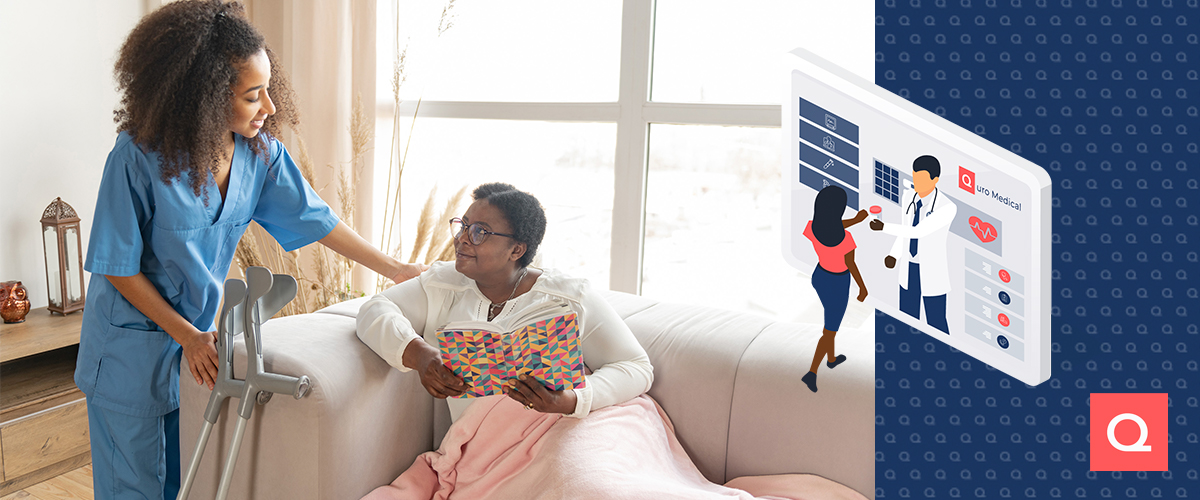
Access to quality healthcare is an ongoing challenge owing to rising costs and limited capacity and resources on a backdrop of a growing burden of disease and an ailing healthcare system. Moreover, the Covid-19 pandemic has exposed the limitations of our healthcare system when more than the usual number of patients required hospitalisation and couldn’t access life-saving care.
Digital health tech start-up, Quro Medical, has innovative offerings to relieve an overburdened healthcare system and address the issue of costly medical care. Quro Medical's technology allows for patients to receive hospital-level care right at home, eliminating the need to find them a bed in a healthcare facility for observation and monitoring at an exorbitant cost.
“The idea for the Quro Medical solution was inspired by experiences of healthcare systems globally who despite being better resourced, were facing similar challenges to South Africa. Hospitals the world over are buckling under pressure and lack the space to accommodate the growing number of people in need of hospital care and are increasingly unaffordable…building more hospitals is clearly not the solution ” says Dr. Vuyane Mhlomi, Co-founder and CEO of Quro Medical.
With the hotly debated National Health Insurance (NHI) bill drawing a lot of attention, Quro Medical's comprehensive telehealth and care at home solution presents a major opportunity in easing the burden - making healthcare more affordable and available for everyone with even better clinical outcomes.
“The Quro Medical platform is a truly South African developed telehealth solution that was designed in-house by the Quro Medical tech team, using Typescript and React. We have a number of wireless medical-grade devices which collect health data minute-by-minute, and link through a relay device to our clinical command centre, where we monitor and analyse clinical data in real-time. A patient’s doctor also has access to this monitoring platform so that they can easily manage the treatment plan for their patients. Our platform allows clinicians to make data-driven decisions immediately in order to offer the best and appropriate medical care that is needed for each specific patient,” says Joost Pielage, Quro Medical CTO.
This, the first hospital-at-home solution for South Africa, notes Pielage, has been developed using Fast Healthcare Interoperability Resources (FHIR) - a level seven international standard for electronically exchanging healthcare information. The Quro Medical solution is maintained by a team of experienced developers and is constantly updated to be a full-feature platform that will include more functionalities with Machine Learning and AI capabilities built-in as it scales up.
Adds Pielage: “Using the FHIR standard our Quro Hospital-at-Home solution integrates with most medical systems to enhance interoperability. For instance, we are integrated with a leading laboratory company and we are able to analyse patients' blood test results as they become available to take immediate action when results fall outside of the prescribed limits.”
The easy-to-use devices currently include a chest patch that enables continuous vital sign monitoring, and additional hardware for real-time, intermittent monitoring of patients’ oxygen and sugar levels. The chest patch is a discreet, multiparameter biosensor that monitors a patient's heart rate, ECG, respiratory rate and core body temperature - ordinarily monitored in the hospital. It also measures patient movements, like steps taken, body position and fall detection. “When there is a sudden change in health data (e.g., heart rate or temperature) or a change in body position (e.g., like when a patient has fallen) is picked up by the patch, the system alerts us and the command centre immediately informs the in-care clinical team to follow up on the patient – all in real-time, 24/7,” Pielage explains.
All the clinical data from the various devices is sent to the Quro Medical command centre via a relay device with the backing and support of a leading mobile operator, MTN, to allow for uninterrupted service and no downtime.
Most people are concerned about security when it comes to their medical data and information, but Pielage says patients don't have to worry about the security of their information. “When it comes to medical data, we understand the importance of keeping a patient's clinical data protected. We adhere to the Protection of Personal Information (POPI) Act, so our system ensures that all the data is encrypted, and we keep the information secure. Patients need not worry that their data will become public knowledge,” Pielage stresses.
Quro Medical's total solution includes not only technology but also a growing community of more than 350 signed up doctors, that all come together to service their patients.
The solution has already garnered $1.1m in funding and is supported by 90% of the medical aid schemes and the medical insurance market locally.
The healthcare funder's willingness to accept and reimburse for the Quro Medical service offering speaks volumes in terms of the level and quality of medical and clinical care the company provides patients. They would not have signed up and supported Quro, notes Pielage, if the Quro Medical technology and overall clinical care the company provides did not match their high standards.
“Our hospital at home offering is an excellent value-based care solution. It not only eases the burden on healthcare facilities and their clinical teams but also eases the minds of those patients under our care as well as their pockets. We are also 100% certain that Quro Medical has developed a viable and responsive solution that addresses the major concern many have about the cost, quality of care and funding surrounding the proposed NHI, because of the excellent value our solution offers,” concludes Pielage.